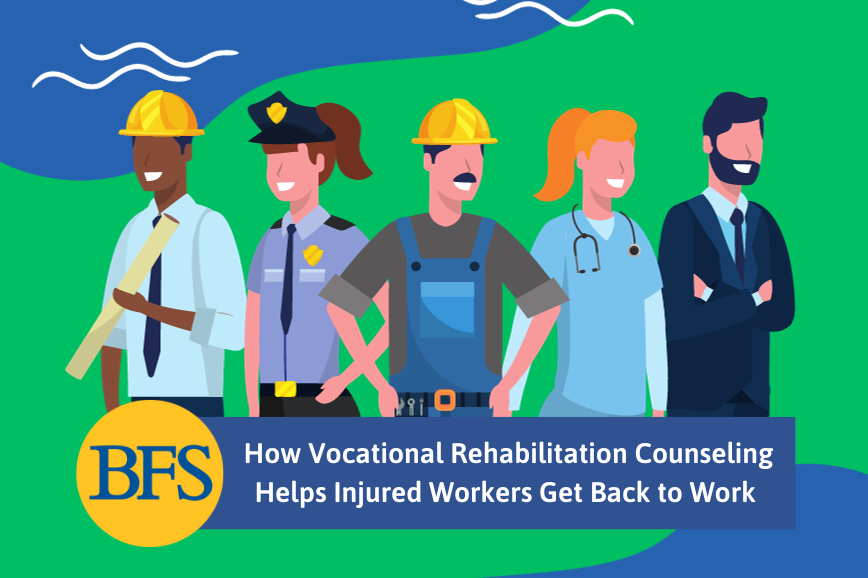How Vocational Rehabilitation Helps Injured Workers Get Back to Work

Getting well again and paying household bills are usually the most urgent priorities for Vermonters who experience a workplace injury. Going back to work is next—but what if you cannot return to the same kind of work or earn the same wage as before?
On National Career Coach Day (January 8), our attorneys answer five questions about vocational rehabilitation counseling, an important workers’ compensation benefit that can help injured workers continue their careers and return to productive work with the support of a trained vocational counselor.
What is vocational rehabilitation counseling?
Many injured workers heal and return to work, but unfortunately some workers can’t do their old job again after a workplace injury. This can happen if the injury is especially severe or if they are left with an impairment. If your work injury leaves you unable to do your previous job or earn the kind of money you were making before, then you may be eligible to get vocational rehabilitation (VR) services. A good VR counselor can help you get back to work at your previous wage level or as close to it as possible. If you need to be retrained or go back to school to get a new job or a different kind of job, VR can assist with this too.
How does vocational rehabilitation work?
A VR provider is a professional counselor who will meet with you, assess your work capabilities, and help you find the right type of work and wage level for your situation. If you cannot go back to your previous job, a good VR counselor can help you to identify a new career path, identify your work-related abilities and interests, retrain to develop employable skills, identify job opportunities, build a résumé, learn interview skills, and more.
How to choose a vocational rehabilitation counselor
In Vermont, you get to choose your VR provider. This is important because VR counselors are the key to getting you back to your pre-injury wage. They can get you back to work earning money and help you to avoid a lifetime of disability. If you do not know who to choose or what your rights are, call or text us at 802-229-5146. We know the VR providers in the Vermont workers’ compensation system, and we can advise you on who to choose and who to avoid for your individual situation.
Who pays for vocational rehabilitation benefits?
VR is one of four benefits you are entitled to get if you have an accepted Vermont workers’ compensation claim. This means that if you are found eligible to get VR services, the workers’ compensation insurance carrier must pay for them. Our team can hold the insurance company accountable and help make sure that they pay for the services you are entitled to.
How vocational rehabilitation counseling has helped others
BFS has helped hundreds of our workers’ compensation clients get VR services. These are just three examples.
- A client tore her rotator cuff while working as a medical technician and was not able to continue doing the same kind of work. She was awarded $75,000 in VR benefits to go back to school and study to become a nurse.
- A client who installed and repaired overhead doors severed two tendons in his hand and was unable to go back to his old job because of restrictions after undergoing hand surgery. The insurance company paid more than $20,000 for work capacity testing by an experienced VR counselor, a construction training program, and other costs associated with his return-to-work plan. After completing the program, our client immediately found a new job as a heavy equipment operator—a job that he could safely perform and a job that paid him even more than he had been earning when he got injured.
- A client suffered work-related physical and psychological injuries that caused her to leave her job as a rehabilitation specialist. She went back to school and got a master’s degree in counseling, but the Vermont Department of Labor refused to reimburse her tuition expenses even though injured employees are entitled to VR services, including retraining, when they can’t go back to their previous job. With our help (including representing her at trial before the Vermont Supreme Court), she was able to get her tuition bill of almost $14,000 reimbursed.
At Biggam Fox Skinner, we understand that returning to work can be difficult, especially if you cannot go back to the job you had before. You need legal advocates on your side who can help you get counseling to find employment that matches your capabilities at a wage that’s similar to your old job.
Contact BFS at 802-229-5146 to schedule your free consultation with our firm.
Get a FREE Case Evaluation Today
Send us a short message describing your case, and our lawyers will get back to you as soon as possible. Our office hours are Monday–Friday 8:30 a.m.–5:00 p.m.